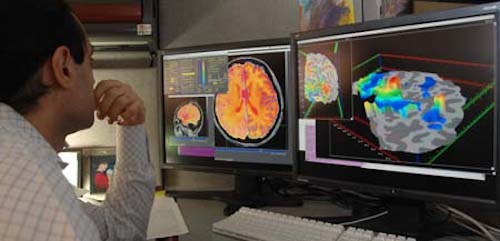 Neuroscience & Mind
Neuroscience & Mind
Fallacies of Contemporary Neuroscience: "A Vast Collection of Answers, with No Memory of the Questions"

Philosopher Ed Feser has a great post on the fallacies of contemporary neuroscience:
We’ve had several occasions… to examine the fallacies committed by those who suppose that contemporary neuroscience has radically altered our understanding of human nature, and even undermined our commonsense conception of ourselves as conscious, rational, freely choosing agents. In a recent Spectator essay, Roger Scruton comments on the fad for neuroscientific pseudo-explanations within the humanities, labeling it “neuroenvy.”
Here’s an especially insightful passage from the piece:
[Scruton:] Neuroenvy… consist[s] of a vast collection of answers, with no memory of the questions. And the answers are encased in neurononsense of the following kind:??
‘The brains of social animals are wired to feel pleasure in the exercise of social dispositions such as grooming and co-operation, and to feel pain when shunned, scolded, or excluded. Neurochemicals such as vasopressin and oxytocin mediate pair-bonding, parent-offspring bonding, and probably also bonding to kith and kin…’ (Patricia Churchland).??
As though we didn’t know already that people feel pleasure in grooming and co-operating, and as though it adds anything to say that their brains are ‘wired’ to this effect, or that ‘neurochemicals’ might possibly be involved in producing it. This is pseudoscience of the first order, and owes what scant plausibility it possesses to the fact that it simply repeats the matter that it fails to explain. It perfectly illustrates the prevailing academic disorder, which is the loss of questions.
“A vast collection of answers, with no memory of the questions” is a stunningly accurate way to describe the modern fallacy of attributing mental acts to physical brain processes. No one doubts that mental states are associated with brain states. But it is breathtakingly naive to assert that the mental state is “explained” in any meaningful way by the brain state. Regional changes in brain blood flow measured by fMRI scanning don’t explain the love (or hate or anger or belief or joy) we feel at the moment the changes are measured.
Thoughts and emotions are mental acts that inherently entail intentionality (reference to something other than self), qualia (the subjective experience of things) that transcend mechanical explanation. Crude materialist reductionism has little real explanatory power.
Modern neuroscience has provided so many answers that we’ve forgotten the questions.
Feser suggests the antidote to neuroenvy:
Materialists typically assume that the Cartesian move is what anyone who criticizes their reductionism must be committed to. (See Chapter 4 of Aquinas for a detailed account of the differences between the Aristotelian-Thomistic and Cartesian views of human nature.) And so deeply and unreflectively have they imbibed reductionist thinking that they fail to perceive that the arguments that they think prove reductionism really only assume reductionism — begging the question, and none too subtly at that. In particular, they fail to see that the stuff about increased dopamine levels “proves” that addicts lack moral responsibility, or that Libet’s experiments “prove” that we lack free will, only if we already assume that human action is entirely reducible to the neural phenomena in question, which is of course precisely what is at issue. And they would also beg the question were they to insist that categories like formal and final causation are acceptable only if they can somehow be reduced to those recognized by physics, chemistry, biology, or neuroscience.
Meanwhile, critics like Scruton and Raymond Tallis, while they rightly denounce reductionism of both a materialist or Cartesian sort, fail to put in its place a systematic rival metaphysics like the Aristotelian one. Powerful as their criticisms are, their positive account of human nature is bound to seem obscurantist to those who cannot see any plausible alternative to materialism as a general conception of the natural world. For it takes a metaphysics to counter a metaphysics. Until materialism, scientism, and naturalism are not only criticized but replaced with something better, they will not lose the baneful grip on modern culture that Scruton and Tallis rightly deplore.
Materialist reductionism of the mind is a foolish mistake. A rudimentary mistake. The Aristotelian hylomorphic understanding of the mind is a correction for that mistake, and seems to me to be closest to the truth.
